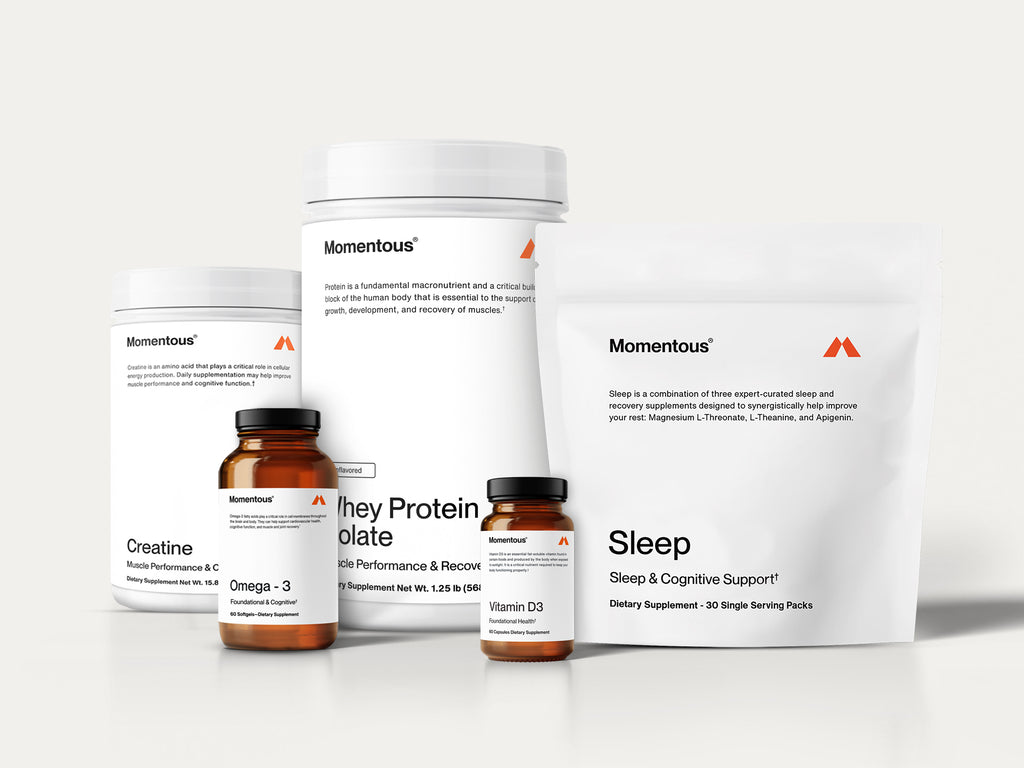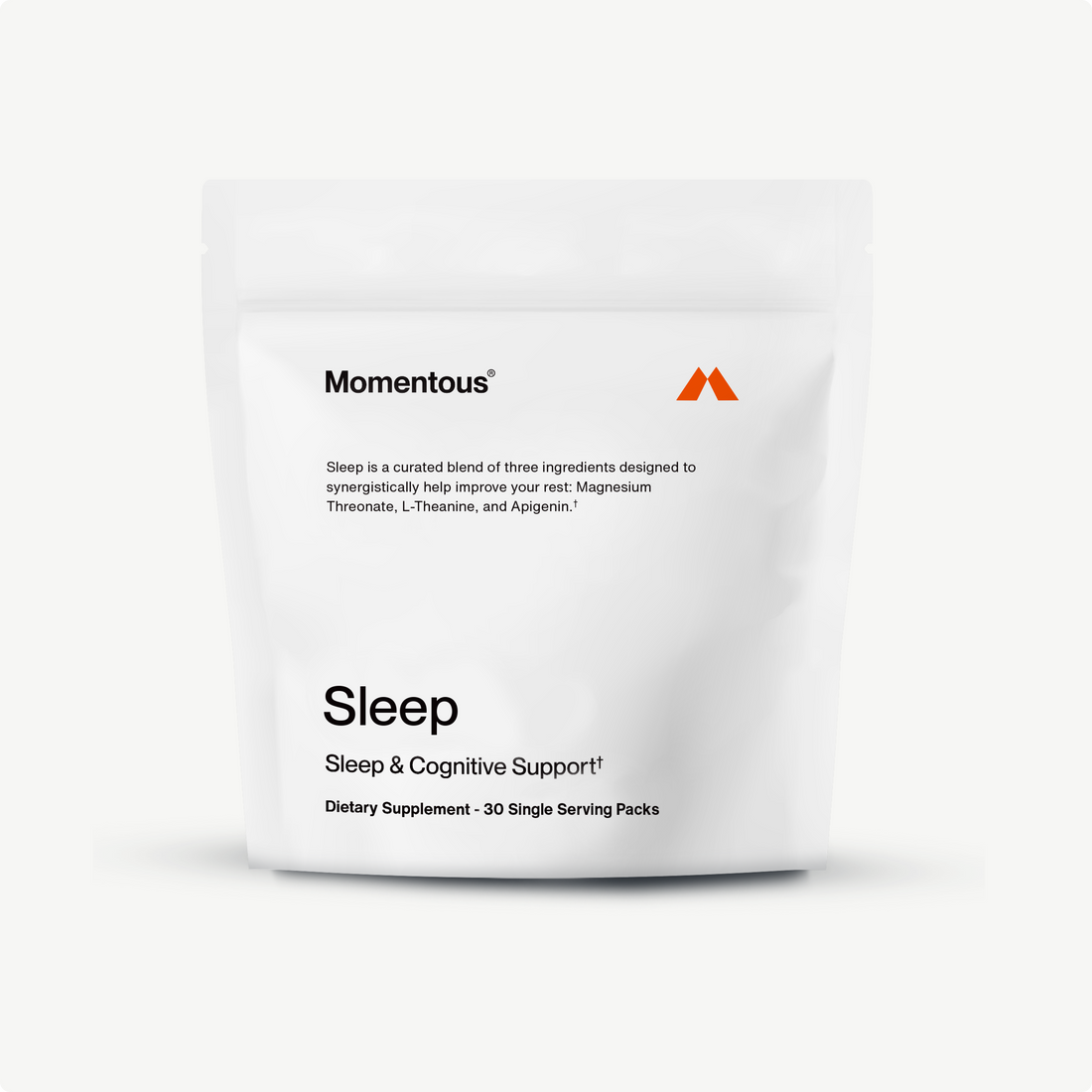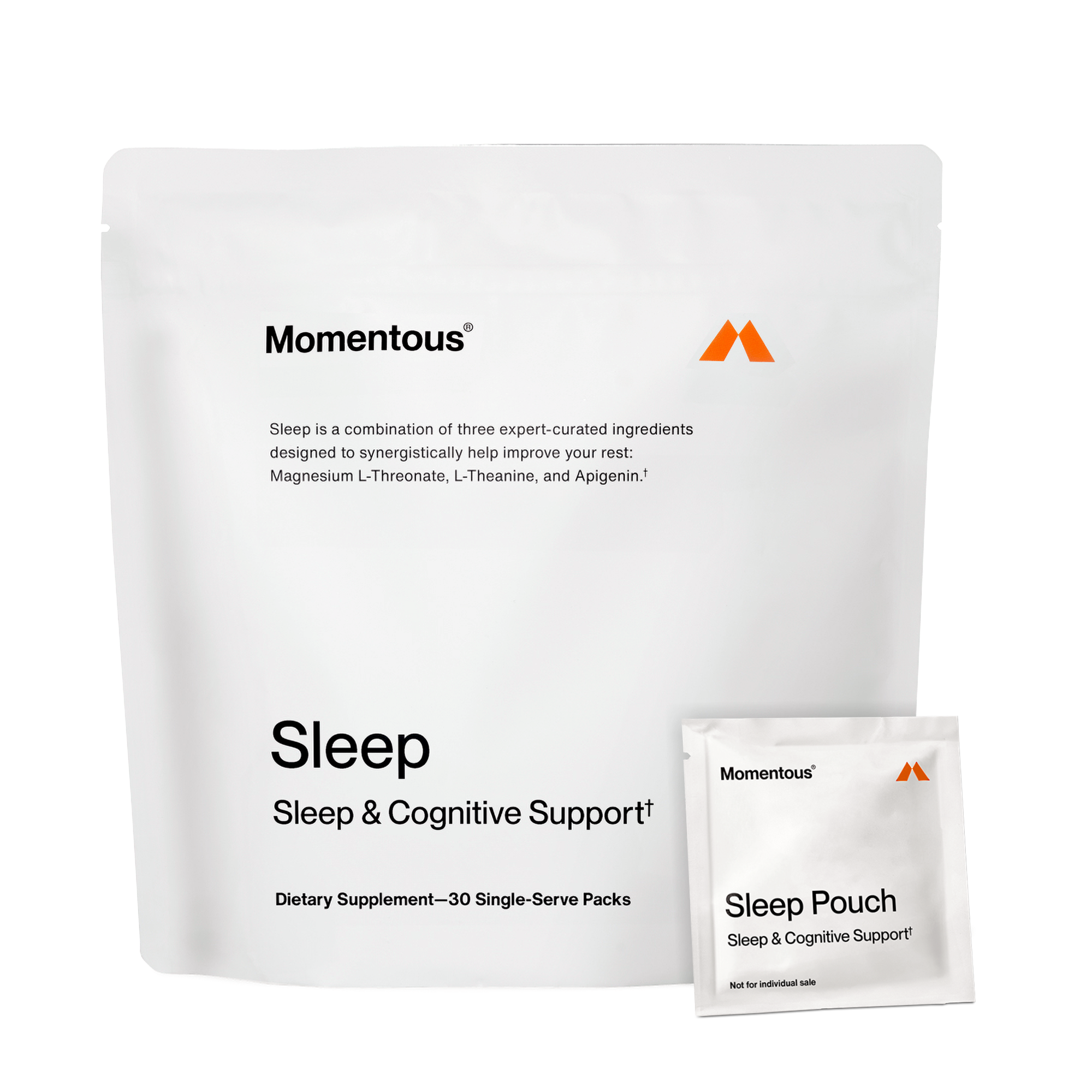Science-backed combination of Magnesium L-Threonate, L-Theanine + Apigenin to help optimize your sleep
Getting a good night's sleep is essential for optimal health. Unfortunately, many people have trouble getting the sleep they need—and that's where Sleep can really help. Featuring three key ingredients that prime you for a good night's rest—Magnesium Threonate, L-Theanine, and Apigenin—Sleep is conveniently packaged into one 30-day supply of easy-to-use tear-away packs. As part of his powerful Toolkit for Sleep, world-renowned Momentous partner Dr. Andrew Huberman helped select the best ingredients and dosages to include in each pack. Let's explore these ingredients further to understand the science of how they promote better sleep.
Magnesium L-Threonate
Magnesium directly supports more than 300 enzymatic processes in the body, including healthy cardiac and lung function, bone density, muscle tenderness, and fatigue. It is also necessary for the body to convert vitamin D3 into its active form to support bone health, immune system support, brain function, and sleep quality. Magnesium L-Threonate is a specific form of magnesium that has been shown to be more effective at crossing the blood-brain barrier and increasing brain levels of magnesium.
While researchers recognize that magnesium plays a vital role in sleep regulation, they still need to fully understand its effect on sleep behaviors. Early studies have shown that magnesium helps to block NMDA receptors and activate GABA receptors which can help produce a calming effect and may increase natural melatonin levels, helping to improve sleep (1). What's clear from the research is that a lack of magnesium negatively impacts your sleep.
Apigenin
Apigenin is a bioflavonoid compound that is found in a wide variety of plants and herbs. Flavonoids are widely known for their antioxidant properties and a considerable number of studies have reported the antioxidant properties of apigenin.
Abundant in chamomile tea, apigenin binds to receptors in the brain and can help to reduce feelings of stress and promote higher-quality sleep. Specifically, apigenin activates chloride ion channels, calming overall neuronal activity in the forebrain and allowing the body to enter a more restful state. Studies have shown that apigenin can increase total sleep duration and help you fall asleep faster (2). Research has also demonstrated that apigenin can decrease the stress hormone cortisol (3).
L-Theanine
L-Theanine is an amino acid found in tea leaves and some mushrooms that promotes relaxation without causing drowsiness. Theanine is similar to glutamate, another naturally occurring amino acid. Glutamate helps transmit nerve impulses in the brain.
L-Theanine promotes relaxation and facilitates sleep by contributing to several changes in the brain (4). These changes include elevating the neurotransmitters GABA as well as serotonin and dopamine. L-Theanine also reduces chemicals in the brain linked to stress and anxiety. This may also be a way that L-theanine can protect brain cells against stress and age-related damage. Finally, L-Theanine also appears to trigger alpha waves in the brain. These alpha waves are present during REM sleep and are associated with a state of relaxation and focus.
We've made it easy to build your new nighttime routine. When taken as part of your proper nighttime protocols, these three ingredients in Sleep will ease you into sleep and help you stay asleep through the night, letting you wake up more rejuvenated and with more energy throughout your day.
----
1). Abbasi B, Kimiagar M, Sadeghniiat K, Shirazi MM, Hedayati M, Rashidkhani B. The effect of magnesium supplementation on primary insomnia in elderly: A double-blind placebo-controlled clinical trial. J Res Med Sci. 2012 Dec;17(12):1161-9. PMID: 23853635; PMCID: PMC3703169.
2). Godos J, Ferri R, Castellano S, Angelino D, Mena P, Del Rio D, Caraci F, Galvano F, Grosso G. Specific Dietary (Poly)phenols Are Associated with Sleep Quality in a Cohort of Italian Adults. Nutrients. 2020 Apr 26;12(5):1226. doi: 10.3390/nu12051226. PMID: 32357534; PMCID: PMC7282005.
3). Ohno S, Shinoda S, Toyoshima S, Nakazawa H, Makino T, Nakajin S. Effects of flavonoid phytochemicals on cortisol production and on activities of steroidogenic enzymes in human adrenocortical H295R cells. J Steroid Biochem Mol Biol. 2002 Mar;80(3):355-63. doi: 10.1016/s0960-0760(02)00021-3. PMID: 11948020.
4). Rao TP, Ozeki M, Juneja LR. In Search of a Safe Natural Sleep Aid. J Am Coll Nutr. 2015;34(5):436-47. doi: 10.1080/07315724.2014.926153. Epub 2015 Mar 11. PMID: 25759004.










